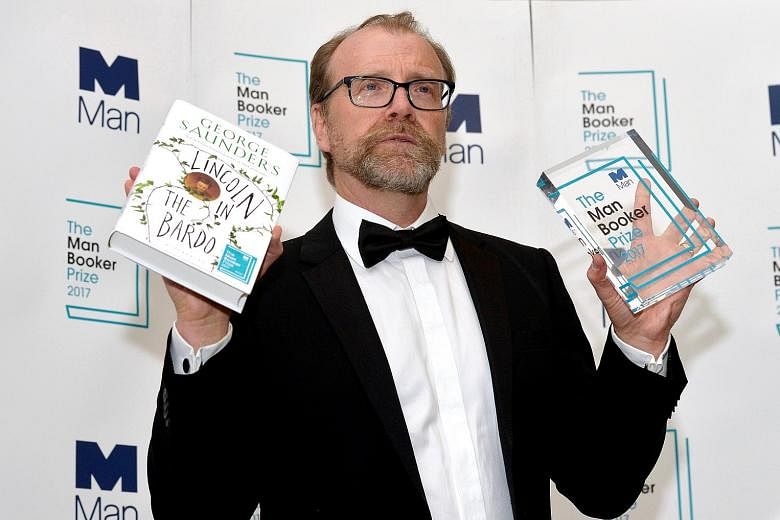LONDON • George Saunders won the Man Booker Prize on Tuesday for his surreal, experimental first novel, Lincoln In The Bardo, becoming the second American in a row to win the coveted British literary award.
His winning novel describes a night in Washington in 1862, when a grieving president Abraham Lincoln visits the crypt that holds the body of his 11-year-old son, Willie, who died of typhoid fever. At the graveyard, Willie's spirit is joined by a garrulous, motley community of ghosts who exist in the liminal state between life and death.
The prize, worth £50,000 (S$89,340), guarantees increased sales around the world, although Lincoln In The Bardo was already a bestseller in the United States.
At a ceremony in London, Saunders, 58, described the award as a "great honour, which I hope to live up to with the rest of my work, for the rest of my life".
In a brief acceptance speech, he made several thinly-veiled references to the controversial policies of US President Donald Trump.
"We live in a strange time," he told the audience. "In the US now, we're hearing a lot about the need to protect culture. Well, this tonight is culture."
He later told reporters he was in disbelief. "For an artist, I think validation is really helpful," he added. "My opinion of myself improves a little bit."
Lola Young, the chair of judges, said the novel was "unique" and "stood out because of its innovation, its very different styling; the way in which it paradoxically brought to life these almost dead souls, not quite dead souls, this other world".
By awarding the prize to Saunders, the judges will likely face a renewed backlash from critics who have complained that the prize has become Americanised.
Last year, Paul Beatty became the first American to win when he received the prize for The Sellout, a dark satire about race and the legacy of slavery and segregation in America.
This year, three of the six finalists were American, which prompted another round of criticism that emerging British and Commonwealth writers were being overlooked.
Speaking on behalf of the judges, Young dismissed the notion that Americans have colonised Britain's most prestigious literary award.
"We don't look at the nationality of the writer," she said. "We're solely concerned with the book, with what that book is telling us."
Until recently, the Man Booker, which was first awarded in 1969, was restricted to novels written by authors from Britain, Ireland and the Commonwealth nations.
In 2014, the contest was opened to any novel written in English and published in Britain. Past winners include Margaret Atwood, Kazuo Ishiguro, V.S. Naipaul and Hilary Mantel.
In addition to Saunders, the other Americans to make the list of finalists were Paul Auster, who was nominated for 4321, an epic narrative that tells a Jewish boy's coming-of-age story in four versions; and Emily Fridlund, for her debut novel, History Of Wolves, about a teenage girl growing up in a commune in the Midwest.
The other finalists were British novelist Fiona Mozley, whose debut novel Elmet, centres on a single father raising his teenage children in rural Yorkshire; British-Pakistani writer Mohsin Hamid, nominated for Exit West, a surreal, dystopian story about two refugees fleeing a civil war through magic doors; and British novelist Ali Smith, whose novel Autumn, about the relationship between a middle-aged British woman and a 101-year-old man, explores the rise of British nationalism.
Smith, who has been shortlisted for the Booker four times, was considered a favourite to win this year.
Before he wrote Lincoln In The Bardo, Saunders was best known for his dark and often funny futuristic, dystopian short stories.
Born in Amarillo, Texas, and raised in and near Chicago, he never imagined growing up that he could one day write for a living. He got a degree in geophysics from the Colorado School of Mines, then worked as a geophysicist in Sumatra, where he read to keep himself occupied at a remote camp.
When he returned to the US, he supported himself with odd jobs, working as a doorman, a roofer and in a slaughterhouse.
He eventually enrolled in an MFA programme at Syracuse University and, in 1996, he published his debut fiction collection, CivilWarLand In Bad Decline, which established him as an innovative writer with a dark, demented streak. He went on to publish several other collections and novellas, including his widely celebrated 2013 short story collection, Tenth Of December.
He first got the idea for Lincoln In The Bardo many years ago, when he was visiting Washington and his wife's cousin pointed out the crypt and told him the story about how Lincoln would visit his son's body. The story stayed with him for some 20 years, but felt too daunting.
Finally, in 2012, he began to work on the novel.
Saunders, a Tibetan Buddhist, drew on the Buddhist notion of the bardo - the phase of existence between death and rebirth - bringing a supernatural layer to the historical setting.
"For me, the book was about that terrible conundrum: We seem to be born to love, but everything we love comes to an end," Saunders said in an e-mail interview with The New York Times Book Review. "What do we do with that?"
WASHINGTON POST, AGENCE FRANCE-PRESSE, NYTIMES

